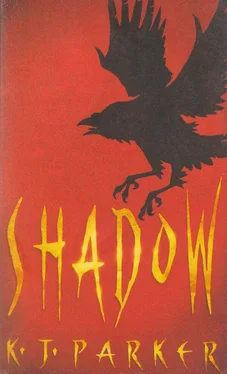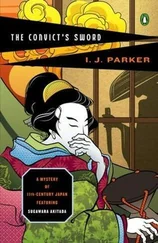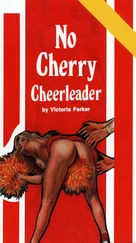K Parker - Shadow
Здесь есть возможность читать онлайн «K Parker - Shadow» весь текст электронной книги совершенно бесплатно (целиком полную версию без сокращений). В некоторых случаях можно слушать аудио, скачать через торрент в формате fb2 и присутствует краткое содержание. Жанр: Фэнтези, на английском языке. Описание произведения, (предисловие) а так же отзывы посетителей доступны на портале библиотеки ЛибКат.
- Название:Shadow
- Автор:
- Жанр:
- Год:неизвестен
- ISBN:нет данных
- Рейтинг книги:3 / 5. Голосов: 1
-
Избранное:Добавить в избранное
- Отзывы:
-
Ваша оценка:
- 60
- 1
- 2
- 3
- 4
- 5
Shadow: краткое содержание, описание и аннотация
Предлагаем к чтению аннотацию, описание, краткое содержание или предисловие (зависит от того, что написал сам автор книги «Shadow»). Если вы не нашли необходимую информацию о книге — напишите в комментариях, мы постараемся отыскать её.
Shadow — читать онлайн бесплатно полную книгу (весь текст) целиком
Ниже представлен текст книги, разбитый по страницам. Система сохранения места последней прочитанной страницы, позволяет с удобством читать онлайн бесплатно книгу «Shadow», без необходимости каждый раз заново искать на чём Вы остановились. Поставьте закладку, и сможете в любой момент перейти на страницу, на которой закончили чтение.
Интервал:
Закладка:
That struck him as a strange attitude, but he was still trying to figure out why she'd forced the issue earlier by kicking the rider. He could think of at least three explanations, but none of them felt right. 'If that's the way you feel about it,' he said. 'But at the very least, as soon as we come in sight of the place, you go on ahead. I'll follow up on foot and meet up with you there.'
'Not a chance,' she replied firmly. 'You're the god in the cart, remember? It's got to be done properly, or else we'll really be in trouble.'
Well, that fitted in with explanation number two, but he still wasn't convinced. 'All right, then,' he said. 'I still figure it's a bloody stupid risk to take.'
'So's being born,' she replied, as if that was any kind of an argument.
Later, she told him about the god act.
'Your name's Poldarn,' she said. 'At least, that's the name we've been using, and there's no reason why we shouldn't stick with it.'
'Poldarn,' he repeated, 'No, doesn't mean anything to me.'
She laughed. 'I'd be absolutely amazed if it did,' she replied. 'You see, the god these people believe in hasn't got a name, it's forbidden or some such crap, at least until the second coming. So we had to make one up. At least, I didn't make it up exactly, it's a real name.'
'A real god's name?'
'There aren't any real gods, silly. No, it's something I remembered from when I was a kid, actually. The alley we lived in, there was a builder's yard, and they had stacks and stacks of roof tiles, all piled up as high as a haystack, and my brother and I used to play in there sometimes. Strictly against the rules, of course-I can see why, thinking back, because those stacks weren't meant for clambering about all over, and if one of 'em had collapsed we'd have been squashed like bugs. Anyway,' she went on, 'we used to play hide and seek, and I have this crystal-clear picture of myself hiding among these stacks, tucked away in a little child-sized hole only I knew about, and lying there for what seemed like hours at a time while my brother looked for me, and all that time I was reading the maker's name stamped on the tiles, over and over again: Poldarn House Torcea, Poldarn House Torcea, in exactly the same place on thousands upon thousands of tiles. Of course, I hadn't got a clue about how they made the things, I thought it was a little man with a chisel or something, and it beat me how on earth he was able to get it so exactly precise every single time… Anyhow,' she said, frowning, 'that's why I had this name Poldarn floating around in my head, and that's what we called the god. So now you're Poldarn.'
'Right,' he replied. 'Named in honour of a brick. Why not, after all?'
'You don't like it.'
'I think it's a wonderful name,' he said irritably. 'Or at least, it has a hell of a lot going for it as against nothing at all.'
'Fine,' she replied. 'That's settled, then. Now, the way we do the show is like this…'
The first thing they saw was the remains of a charcoal burners' camp, stranded in the middle of a broad, flat plain covered with tree stumps.
'I think they used to use up something like four square miles of forest a year,' Copis said. 'At least, that's what I heard once. It's one of the reasons why it's so bleak and boring in these parts. There's old iron mines scattered about all through here, from the Mahec down to Sansory-nearly all worked out, of course-and they used charcoal to smelt the ore, or whatever the technical terms are. A hundred and fifty years ago, all this lot was forest.'
'You don't say.'
'Oh, it's worse the other side of the Bohec. They cleared that about, what, seventy years ago, and it's incredible in some places. Where they cut the trees and left the top branches, it's all grown over with briars and weeds and stuff, all tangled up like a thorn hedge a mile thick. From time to time there's big fires, in the dry season. Nothing else could ever clear it.'
He thought about that as he stared at the fire pits and slagheaps, submerged under thick mats of nettles and docks, and the countless lopped trunks, like the dead bodies after a battle. 'What did they need all that iron for?' he asked.
'There was an imperial armoury at Weal Bohec,' Copis replied. 'It supplied all the soldiers in the province. The foundry there turned out something like a thousand tons of iron a year. Don't ask me how I know all this,' she added. 'Useless information just gets stuck in my head, like flies in a spider's web.'
'Lucky you.'
She laughed. 'Yes, well,' she said. 'Probably it was one of the customers told me, when I worked in the cat-house in Josequin. My God, didn't some of them love the sound of their own voices…? Worst part of the job, really, and that's saying something.'
She hadn't mentioned that before, not that it mattered. It was an interesting thought that this desert of couch grass and bog had once been a great forest. Interesting that even the landscape could lose its memory so completely, could go from being so full to so empty. For some reason, he almost found it comforting.
'Anyway,' he said, 'the town's just ahead, is it?'
'Should be,' she replied. 'Pretty soon we'll start seeing the smoke.'
'Smoke?'
'There's still a foundry there,' Copis explained. 'Only reason for having a town out in the middle of all this. I think they make a living from scavenging bits of stuff from the old worked-out mines, bits the original miners missed or couldn't be bothered to go after. They burn peat now, since they can't use charcoal.'
That was an interesting thought, too; having used up everything that grew in it, they were using up the ground itself. It hadn't occurred to him that iron was so destructive.
The further they went, the drearier the landscape became. Here and there he saw big briar tangles, which he took to be overgrown loppings, such as Copis had described earlier, and a fair sprinkling of derelict buildings-sheds and stores, built low out of rough-cut stone blocks, with broken-backed slate roofs drowning in creepers and nettles. A very predatory kind of place, he decided, where the people ate up the ground and the ground swallowed up the buildings, killers and carrion-feeders, making up a cycle.
'I hope the town's a bit more cheerful than this,' he said. 'It'd depress me, living somewhere like this.'
'For all you know,' she replied, 'this is home.'
'Now there's a charming thought.'
He kept looking for smoke, but there wasn't any, just the usual low cloud (or mist, or possibly heat-haze) that blurred the distinction between ground and sky. Copis, who'd been assuring him that any moment now they'd encounter the first outlying farms and workshops, stopped talking entirely; she was staring at the skyline like a bird, scanning from a great height. There were more buildings now, but still all derelict, the skeletons of houses and barns. There were dry-stone walls, so overgrown with grass and weeds that they looked like banks; a few boundary stones, sticking up like the remaining teeth in an old man's mouth; details like a stone watering-trough split by the frost, a deer hunter's high seat fallen on its side and sinking among the nettles, a millstream clogged with weeds, a dovecote bald of thatch and leaning at an angle on its post.
'Actually,' Copis said, in an unusually subdued tone of voice, 'you get this sort of thing all over the place. It's where a whole village gets called up for military service; they're marched off to the wars somewhere and they don't come back. Either the government resettles the families somewhere else-that's what they're supposed to do, at any rate-or the people who were left behind just go away, to a town or wherever. All these little wars they keep having use up a lot of manpower.'
They stumbled on the town quite unexpectedly, just as it was starting to get dark; what was left of the ruined walls had grown over so quickly that at first they mistook them for more briar clumps, and it was only when they began noticing angles of brick and stone peeping out from under the weeds, like the edge of the bone in a bad fracture, that they realised what they were looking at. It had happened within, say, the last ten years. Long enough for several seasons of rain to have washed most of the soot off the ruined walls, for the scattered timbers to have been bleached grey or green under a thin slime of lichen, for the crows to have pecked the skulls and bones as clean as a good child's plate. Here and there the remains of a door still hung off its hinges, a few rafters framed the sky over a gutted house, a few paving stones peeped out from under the grass; a few moments of the old normality, incongruous among the new growth. They were looking at the final stages of the change from scab to scar; another year or so and there would be nothing here but a healed-over ruin, its sharp edges all rounded off by rain, wind and growth, its bones covered with new green flesh. The turf and ground and stones would lose their memory and begin all over again.
Читать дальшеИнтервал:
Закладка:
Похожие книги на «Shadow»
Представляем Вашему вниманию похожие книги на «Shadow» списком для выбора. Мы отобрали схожую по названию и смыслу литературу в надежде предоставить читателям больше вариантов отыскать новые, интересные, ещё непрочитанные произведения.
Обсуждение, отзывы о книге «Shadow» и просто собственные мнения читателей. Оставьте ваши комментарии, напишите, что Вы думаете о произведении, его смысле или главных героях. Укажите что конкретно понравилось, а что нет, и почему Вы так считаете.












